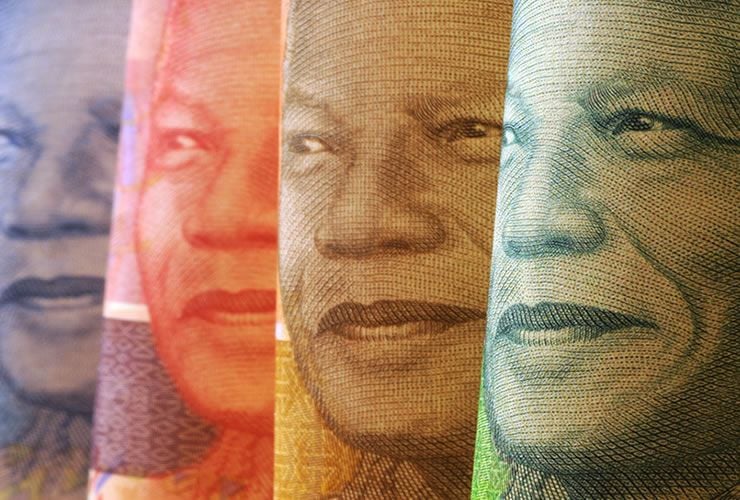The South African Rand is a Sell say Morgan Stanley, as Rand Merchant Bank Forecasts Rate Rise
- Written by: James Skinner
-

© Adobe Stock
- ZAR weakens Monday, on course for fresh losses this week.
- Morgan Stanley say "sell" as SARB is apt to disappoint market.
- Rand Merchant Bank forecasts rate hike before 2018 curtain close.
The Rand is on course for fresh losses this week because the South African Reserve Bank (SARB) is unlikely to deliver what markets are looking for following Thursday's interest rate meeting, according to strategists at Morgan Stanley, who are advocating that clients sell the currency and buy the Dollar.
Morgan Stanley's call comes just days ahead of the latest South African monetary policy decision and just as economists at Rand Merchant Bank warn clients the SARB is likely to hike its interest rate before the curtain closes on 2018, which would be a full year ahead of their previous forecast.
The U.S. bank's bearish bet against the Rand also comes as emerging market currencies remain under pressure against the U.S. Dollar, thanks to Federal Reserve interest rate policy and concerns about the likely economic impact of President Donald Trump's "trade war" with China.
Severe losses for emerging market currencies have themselves spawned further problems for the world's developing economies, such as rising inflation and widening current account deficits.
Central banks in Turkey and Russia raised their interest rates last week in order to stave off further losses and the market may now be looking for the SARB to follow suit Thursday.
"We now expect to see the first interest rate hike in 4Q18 — compared to our previous call for rates to increase in 4Q19 — if the current global environment persists and the rand remains under pressure," says Mpho Tsebe, a currency economist at Rand Merchant Bank.
Tsebe says the SARB is likely to pull the trigger on a rate rise before the year is out but crucially, does not predict a policy change this week. If she is right then markets will have little reason to bid for the Rand following the announcement.
The Morgan Stanley team are thinking along the same lines but have gone a step further in that they are recommending betting against the Rand. They have bought the USD/ZAR rate at 15.50, with a stop-loss at 14.60.
"We remain bearish on ZAR and would like to fade the recent rally," says Gek Teng Khoo, a strategist at Morgan Stanley. "On the back of poor growth data, the SARB is expected to keep rates on hold while staying on the hawkish side. Given most of the EM central banks are in hiking mode with Turkey and Russia being the latest examples, we believe a hawkish comment from the SARB would not prevent ZAR from weakening."
Khoo also warns about the threat posed to the Rand by foreign investors in the South African government bond market. After Moody's spared the nation a downgrade of its local currency credit rating in November last year international investors flooded back into the local currency market.
However, if those investors begin to fear further losses returns-eroding losses from the Rand then they could either choose to sell out of their bonds or simply hedge their exposure. In either case, large amounts of Rand could be dumped onto the market, which would then force the currency lower against rivals, with losses becoming a self-fulfilling prophecy.
"While the SARB will probably revise its inflation forecast to incorporate higher oil prices and a weaker currency, it will also have to take into account a lower starting point and a larger output gap. This makes the timing of a rate hike that much more difficult to call," adds RMB's Tsebe.
Wednesday's inflation data for August could provide investors and traders with early insight into the most likely outcome of Thursday's interest rate meeting.
SARB governor Lesetja Kganyago warned of "upside risks" to the inflation outlook back in July and since then the main consumer price index (CPI) has risen to 5.1%, up from 4.6% back in June.
The SARB is obliged to use monetary policy to ensure that CPI remains somewhere between 3% and 6% while Kganyago said in July the central bank would act if inflation deviates significantly away from the 4.5% midpoint of the target.
Morgan Stanley economists say the inflation rate is likely to have held steady at 5.1% for August, but Tsebe forecasts that it will rise to 5.2%, which is close to the top end of the SARB's target range.
"While the SARB will probably revise its inflation forecast to incorporate higher oil prices and a weaker currency, it will also have to take into account a lower starting point and a larger output gap. This makes the timing of a rate hike that much more difficult to call," Tsebe says.
The USD/ZAR rate was quoted 0.15% higher at 14.91 Monday and is up 20.5% so far in 2018, while the Pound-to-Rand rate was 0.81% higher at 19.60 and has risen 17.7% this year.
Advertisement
Get up to 5% more foreign exchange by using a specialist provider to get closer to the real market rate and avoid the gaping spreads charged by your bank when providing currency. Learn more here
